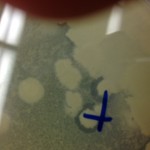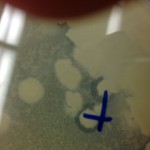Monthly Archives: September 2013
Contamination Plate
Take 3
Today in the lab, after having been given an extra five days to culture and grow, there has still been no phage to cultivate: our second try did not go as we hoped. Also, that streak test that had the interesting anti-bacterial property to it turned out to be relatively insignificant to the class’s goal, so I threw it out along with the rest of the samples: it was a cool, unique finding though! So, now, we are going for it a third time. I’m starting to wonder what about our procedure is going wrong. I have the terrifying suspicion that it is something simple that we are overlooking. Maybe we shouldn’t obey that “hypothesis” about how CaCl_2 increases phage infect-ability as if it were a law. Whatever the issue may be, others are sharing the issue: no Texas schools have cultivated any phage.
I am learning to redefine what failure is and what the real goal of this project is. I need to remember that I am doing this to research and learn, not just to find phages. Whatever it is, I am loving this learning process. However, we will need to start progressing sometime soon or we will have to revert to using the host bacterium of years past: I hope that doesn’t have to be the case
Practice Makes Perfect…ly Annoying
Sample No. 3
Prepare an Enrichment Culture. Again.
We are on our last of the three samples we collected before school starts and I’ll admit, I’m starting to get anxious about finding a phage. I feel like because we have all worked so hard and tried to follow the procedure as strictly as possible, we deserve a phage, at least one!
Sadly, that’s not how science works. Scientists can research one specific thing for years if not decades, so I guess three weeks isn’t too long to suffer without the results we want. Still, the anticipation is killing me! One good thing about not getting a phage, though, is that we get to repeat the same procedures over and over, and the repetition has truly helped me in understanding the procedures we are doing. The first time in the lab, I was so lost. I had to follow the procedure word for word, step by step, and it took an extremely long time to finish the day’s work. Even though I used the correct procedure, I have to say much of the “why” was still over my head.
Now, though, I’m proud to say I actually understand why we do what we do, instead of just grasping what the procedure is. Each step in the process is meant to contribute to a phage infecting the Arthrobacter. I now know why we add calcium chloride to the sample and why we perform serial dilutions. After just three weeks, I am now faster, more efficient, and more knowledgeable about the lab techniques we are using.
I am sort of grateful for the lack of phage, because it enabled me to better understand what we were doing before moving on to another procedure. I guess hard work paid off in a different way than I expected.
Confusion
It is hard to believe that I have just finished the first three weeks of my freshman year of college. On top of all the change with a new state, new professors, new classes, new church, and new friends, I have also been thrown into a crazy research project! To be completely honest, I feel like a 6 year old in the lab. I have never used any of the equipment that we use daily (besides a flask:)). Therefore, I am overcome with confusion and awe. The work we are doing with phages, even if I am barely floating with regards to what exactly is going on, is so intriguing. I cannot wait to come to the place where I harvest a phage and begin to understand all of our lab equipment and am able to develop procedures on my own, instead of relying on a step-by-step manual! So as of now, I am a little confused with all the high-tech equipment and terminology, but thoroughly intrigued by our research!
Reflections on my First Two Weeks in Lab
Coming from a high school with tight funding and a lab with only the most basic equipment, I felt completely lost the first couple of days in lab. I was constantly asking myself, “What is a ___? I’m supposed to what?” After reading the lab manual and understanding little of the procedure, I was very anxious for the labs. However, now, after two weeks of labs, I feel much more comfortable. I am learning so much, and I am having a great time doing the research and making new friends. The opportunity to participate in global research as an undergraduate is priceless, and I am so grateful for this class.
One of the things that excites me most about scientific research is the fact that we do not know all the answers—it is a mystery. Mystery excites me, and I believe that humans are called to pursue mystery and knowledge. Proverbs 2:3-6 says, “If you call out for insight and raise your voice for understanding, if you seek it like silver and search for it as for hidden treasures, then you will understand the fear of the Lord and find the knowledge of God. For the Lord gives wisdom; from his mouth come knowledge and understanding.” I am in lab, ready and willing to learn, chasing mystery, and hoping to glorify God in all that I do.
So as we continue to attempt to isolate a phage sample, I am going to remember that patience is a virtue. I am learning basic laboratory techniques that will be useful throughout my career. One of the most important things I have learned so far is that science is a process that takes time and dedication. I am excited to see how this year affects my life, our class, and the world.
Interesting Results
The first attempt at the experiment was relatively unsuccessful: all of us learned a great deal about laboratory procedure (maybe it was better to make the rookie mistakes on a batch to be thrown out, anyways!), but none of us were able to successfully plant our phage. We tried it all again, though! A few people did find some sort of result, but those were mostly due to contamination.
I had an interesting sort of contamination, though. When I was creating my agar plate, using the streak-test technique, I accidentally used an arthrobacer-sp tube that Carter Lantz was using to set up his Plaque-Assay experiment. Due to my mistake, the plate I made had double the bacteria and two different sets of phage concentrate in it. I though I had ruined the experiment and tried to throw it out. However, Dr. Gibbon and Dr. Adair caught me before I threw it out and encouraged me to incubate the sample and let it grow. I figured “Why not?” and I am very happy they stopped me from throwing it out. Whatever was going on with that bacteria and the phage had some interesting effects. After it grew for two days (09 September-11 September), I checked it and the bacteria had grown like crazy and around some of the major colonies of bacteria, there were areas that had become absolutely clear of everything: bacteria, plaque, agar, everything, all gone. This means that whatever happened to grow in that sample had some sort of antibiotic property to it.
For the agar to have disappeared, something must have consumed it: implying that there was something that grew there. However, looking at it on Wednesday, the whole area was clear: implying that something else killed it or it moved, something must have happened. I went back in today to go check on it (two more days later) and it appeared as if the colonies were starting to regrow over the areas that had been previously cleared.
I have no idea what is going on here, but that is the beauty of research! It may not be 100% related to the SEA-Phages project, but I hope to keep looking into whatever happened here. Maybe another research project someday!
I’ll upload the pictures in just a few minutes.
Comment on This is NOT High School Biology… by bryan_gibbon
This is NOT High School Biology…
This class is a constant reminder that I am no longer in high school anymore.
Sure living in a dorm, not having to ask your parents to go places, and paying for things on your own are all indications of college life, but so far, all my classes now vaguely remind me of the classes I took my senior year of high school.
Except this one.
I feel like high school prepares students for getting into college, but fails to prepare students for the actual college experience. Our biology teaching lab is a prime example of this. I got good grades in high school, but I never really learned the true value of the scientific method or the relevance of modern research. Where high school labs taught you to follow directions, this lab tells you to make your own procedure. Where high school labs asked you to repeat, this lab prompts you to discover. In high school, I would change my results to fit what was expected to happen, for fear of getting points counted off my lab report. In this lab, every result (expected or unexpected, success or failure) holds crucial information that can be used to create new questions or hypotheses. My motivation for performing well in a high school lab was to get a good grade; my motivation for doing well in this lab is to learn as much as I can so that I can then apply what I’ve learned to other courses, to other research, and even to everyday life.
I have learned more in two weeks of not being “successful” than I learned in a year of “successful” lab experiments in high school, and I think that is what college is all about.
Comment on Wanted by bryan_gibbon
I can tell already this will be a fun blog to read!
Do you know anyone with a studio? Y’all should lay down a track an post it on SoundCloud. You’d be all the rage of the SEA!
How does this work?
So if I write this here, will it automatically get posted to the SEA page or do I have to put it there?
Wanted
Comment on Hello world! by Edublogs
Hello world!
Comment on Hello world! by Edublogs
Hello world!
Comment on Hello world! by Edublogs
Hello world!
Comment on Hello world! by Edublogs
Hello world!
Welcome to your brand new blog at blogs.baylor.edu.
To get started, simply log in, edit or delete this post and check out all the other options available to you.
For assistance, visit Edublogs comprehensive support site, Edublogs User Guide guide or check out The Edublogger, which is jammed with helpful tips, ideas and more.
You’ll also find helpful tips on our Blogs @ Baylor homepage.

